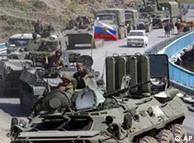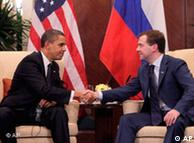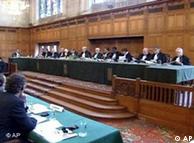INTERNATIONAL RELATIONS | 08.09.2010
Great powers playing politics with Kosovo and Georgia
The international controversy over the fate of de-facto states has intensified this summer. The International Court of Justice (ICJ), which settles disputes between nations, ruled in July that Kosovo's declaration of independence from Serbia is legal. On Thursday the UN General Assembly is set to debate the issue.
The ICJ's ruling came as top Russian and American officials were visiting the splintered country of Georgia. Secretary of State Hillary Clinton spoke out in support of Georgia's territorial sovereignty and condemned Russia's military presence in the region as an occupation.
Weeks later, Russian President Dmitri Medvedev promised to increase financial aid to the tiny republics of Abkhazia and South Ossetia, which secured de-facto independence from Georgia with Russian military assistance two years ago.
Although Abkhazia and South Ossetia have championed the ICJ court decision as confirmation of their aspirations for independence, the truth of the matter is that a balanced decision from an esteemed court means very little in an arbitrary world.
Nation-states remain trapped in what English philosopher Thomas Hobbes called "a war of all against all" where great powers call the shots. And in this disorder, the sword remains mightier than the pen.
The principles of global order
For most of the 20th century, the ideological discipline of the Cold War kept ethnic nationalism firmly under wraps. The politburos in Moscow and Belgrade jealously guarded their territorial integrity at the expense of self-determination, convincing - or forcing -nationalists to trade their aspirations of independence for the promise of a multiethnic Communist utopia.
But the promise never became reality. The communist regimes collapsed, and many historically neglected ethnic groups invested their efforts in a new promise based on another principle: independence.
In the Balkans, Yugoslavia descended into a cycle of violence that ultimately shattered the heterogeneous state into small, ethnic shards. This regional war became an international crisis in 1999 when negotiations between the West, Russia and Serbia failed. As a result, the NATO allies launched an air war against Slobodan Milosevic's regime to end alleged human rights abuses against ethnic Albanians in Kosovo. Ultimately, NATO bombs and a subsequent peacekeeping mission put Kosovo on track toward independence, which it declared unilaterally in February 2008 with Western support.
In the South Caucasus, Georgia gained its independence from a collapsing Soviet Union in 1991. Shortly after Georgia became independent, Abkhazia and South Ossetia sought states of their own, which led to bloody ethnic reprisals. Tensions boiled over into conflict again in August 2008 when Georgia tried to reassert control over the breakaway republics. Russia intervened, formally recognizing the independence of Abkhazia and South Ossetia. Moscow's intervention occurred just six months after Kosovo had declared its independence.
 NATO launched an air war against Slobodan Milosevic's regime in 1999The impact of the ICJ's decision regarding Kosovo's 2008 declaration of independence has become a matter of perception rather than objective truth. The West as well as Georgia consider Kosovo to be an unusual case. Slobodan Milosevic's regime committed ethnic cleansing against the Kosovar Albanians, thereby sacrificing any legitimate claim Serbia may have had to governing Kosovo. But Russia, Abkhazia and South Ossetia see Kosovo as a precedent.
NATO launched an air war against Slobodan Milosevic's regime in 1999The impact of the ICJ's decision regarding Kosovo's 2008 declaration of independence has become a matter of perception rather than objective truth. The West as well as Georgia consider Kosovo to be an unusual case. Slobodan Milosevic's regime committed ethnic cleansing against the Kosovar Albanians, thereby sacrificing any legitimate claim Serbia may have had to governing Kosovo. But Russia, Abkhazia and South Ossetia see Kosovo as a precedent.
"The territorially damaged states [Georgia] see Kosovo as an exception," Uwe Halbach, an expert on the Caucasus with the German Institute for International and Security Affairs, told Deutsche Welle. "On the side of the de-facto states [Abkhazia, South Ossetia] it is always highlighted that the decision on the declaration of independence emphasizes the right to self-determination above territorial sovereignty."
Principles call for consistency. Yet the respective positions of Russia and the US appear to be based more on their own political agendas than a belief in self-determination or state sovereignty rooted in international law. The US can support independence in Kosovo while opposing it in Abkhazia and South Ossetia. Meanwhile, Russia can support independence in Abkhazia and South Ossetia, while opposing it in Kosovo.
"International law itself is indifferent," Halbach said. "International law doesn't support secession, but it's also not against it. In the end politics is decisive."
The politics of great powers
During the Kosovo conflict, Russia viewed itself as the historic guardian of Serbian interests against an expansionist West. However, once NATO mobilized militarily against Belgrade, there was very little Russia could do to stop a Western-backed secession of Kosovo from Serbia. Moscow felt sidelined and not taken seriously as a great power.
So after Kosovo declared its independence in 2008, Russia adopted the case as a precedent. And it applied this precedent in Georgia under the pretence of maintaining stability in the South Caucasus, as the West had done in Kosovo nearly 10 years prior.
 Moscow has security interests in the South Caucasus, which lie on Russia's border"From the Russian perspective they will tell you that their position was not contradictory," Alexandros Petersen, an expert on Eurasian politics at the Atlantic Council, told Deutsche Welle. "They were initially saying Kosovo should not be independent. They were also initially saying Abkhazia should not be independent either. Their position after the break up of USSR supported Georgian sovereignty up until the conflict in 2008. They will tell you their position only changed when the position of the West on Kosovo changed."
Moscow has security interests in the South Caucasus, which lie on Russia's border"From the Russian perspective they will tell you that their position was not contradictory," Alexandros Petersen, an expert on Eurasian politics at the Atlantic Council, told Deutsche Welle. "They were initially saying Kosovo should not be independent. They were also initially saying Abkhazia should not be independent either. Their position after the break up of USSR supported Georgian sovereignty up until the conflict in 2008. They will tell you their position only changed when the position of the West on Kosovo changed."
While the Russians try to equate their role in the Caucasus with the Western role in the Balkans, Petersen draws a distinction between the positions of the two powers.
"Their [the West's] main interest is just stability in the Balkans, a modicum of stability so they can get the hell out of there," he said. "The role of Russia is the perpetuation of stable instability. A simmering instability that they can use to put pressure on Tbilisi and the region [Caucasus] more broadly. It's an important choke point in terms of trans-Eurasian trade."
Russia views itself as the legal successor to the Soviet Union, which - at least in Moscow's eyes - makes it the preeminent power in its near abroad. Although Russian intervention in the South Caucasus has been widely criticized, Moscow does have real security interests in the region.
"In my mind it's a little different between the official proposed position and objective interests," Sergey Markedonov, a visiting fellow with the Russian and Eurasia Program at the Center for Strategic and International Studies, told Deutsche Welle. "Russia as a state having seven areas in the Caucasus has an interest in having stability in this region. The stability of the South Caucasus would have a direct impact on Russian internal security issues."
The sword or the pen?
Since the collapse of the Soviet Union and the end of the Cold War, the global community has yet to find an agreed upon system for resolving conflicts between nations. Instead, unilateral power has increasingly become the instrument by which great powers advance their interests, often at the expense of smaller states.
 Relations between great powers still decide the fate of nations"The main problem for the international order is the absence of common shared standards between key actors," Markedonov said. "The US at the same time supports the territorial sovereignty of Georgia and the independence of Kosovo. Russian behavior is the mirror. There are no common standards. Unilateralism determines the international agenda."
Relations between great powers still decide the fate of nations"The main problem for the international order is the absence of common shared standards between key actors," Markedonov said. "The US at the same time supports the territorial sovereignty of Georgia and the independence of Kosovo. Russian behavior is the mirror. There are no common standards. Unilateralism determines the international agenda."
In a world in which the major actors cannot agree on common principles of world order, a ruling by the International Court of Justice amounts to little more than a whisper of civilization in the brawl of an international jungle.
The interested parties - US, Russia, Serbia, Kosovo, Georgia, Abkhazia and South Ossetia - have manipulated the court ruling for their own political ends instead of using it as an opportunity to find the common standards that the world lacks.
"The broader lesson is that we have not gotten past the great powers meddling, the great powers carving up borders in the sense that we thought we had," Petersen said. "What it underscores in both cases is that it's larger powers with geopolitical interests that determine the outcome of these states."
Author: Spencer Kimball
Editor: Rob Mudge


Kαλά θα κάνουν οι μεγάλοι να μην παίζουν στα γήπεδα Κοσόβου και Γεωργίας γιατί το γκόλ θάναι δύσκολο, κι΄ακόμη η μπάλα μπορεί και να βγεί έξω από το γήπεδο.Ολα σε μεταφορική έννοια.
ReplyDelete